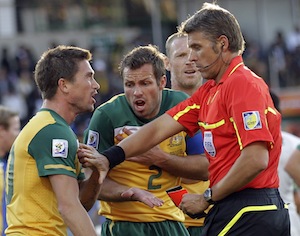
Referee Roberto Rosetti, pushes away Australia's Harry Kewell after showing him a red card during the World Cup Group D soccer match between Ghana and Australia at Royal Bafokeng Stadium in Rustenburg, South Africa, on Saturday, June 19, 2010. (AP Photo/Rob Griffith)
Does the failure of the Socceroos to match the exploits of their 2006 World Cup record blind our judgement on the 2010 World Cup? After all, the relative success or failure of your team inevitably blinds your objectivity.
As one Italian fan told me, the 2010 World Cup was the most boring since 2002, palling in comparison to the 1994 and 2006 editions.
It’s no coincidence that Italy were sent packing early in both 2002 and 2010 and made it to the final in both 1994 and 2002.
Subjectivity blinded his judgement.
For Australian fans, the 2010 World Cup will inevitably pale in comparison to 2006, where the Socceroos took us on such an emotional rollercoaster. The 2010 campaign was deflated in the opening match loss and only pride was recovered with the victory over Serbia.
So putting aside that subjectivity, how did we rate the 2010 World Cup?
The staleness of the opening contests in the group stage gave way to plenty of drama, controversy, goals and thrilling matches (Italy versus Slovakia the pick of the drama, in my opinion) as the tournament unfolded, with momentum swinging between South America (with Argentina leading the charge but all five representatives impressing at certain stages) to Europe, who swept the podium.
We may not have seen confirmation of the “new world order”, but the competition is condensing between continents as the network of professional players migrating to the best leagues around the world increases.
Every confederation with the exception of Oceania was represented in the knockout stages, with New Zealand, the only undefeated team in South Africa (remarkably), only missing out by a point.
There were plenty of sideshows too, from Paul the octopus’ psychic abilities, to promised nudie runs from coaches and lingerie models alike, to the “Nike curse”.
But what should have been sideshow stories impacted the tournament too adversely.
The vuvuzelas, for all their “cultural significance” to the host nation, stifled atmosphere by taking out the crowds and their chants from the matches, while the Jabulani ball was a disaster – a mistake FIFA must never replicate.
But it was another World Cup blighted by far too many incidents of simulation (Ivory Coast’s Kader Keit acting following Kaka’s “hit” the best example) and poor refereeing (take your pick, but Frank Lampard’s missed goal will be replayed for years).
Luis Suarez’s handball was perhaps the most blatant form of cheating we’ve seen at a World Cup and his gloating highlighted how far some footballers are removed from good sportsmanship.
One wonders if the three referees on the park can no longer control the modern game, with its speed and pressures, and the players, well aware of this, are merely taking advantage to win at any cost.
It’s the theatre and drama that makes World Cups, but such simulation and cheating has gone too far.
Back in Australia, SBS should be applauded for another exemplary hosting job.
It wouldn’t be the same without SBS with commitment and coverage that only they can deliver. The addition of Santo, Sam and Ed’s Cup Fever to the coverage gave it a great balance, from the comical “Mark Bresciano’s Cup diaries” to Craig Foster’s pontificating giving both casual viewers and hardcore football fans a World Cup viewing option each night.
The balance was right and you wonder how many non-football fans have been educated on the world game by Santo and co.
And for those who have criticise the forthright opinions of the SBS analysts, just imagine a World Cup hosted by the commercial networks or Fox Sports News hosts and then get back to me on which you’d prefer.
As for the final, it did, in the end, typify the mixed feelings surrounding this World Cup.
For some it was a fascinating arm wrestle as both teams squandered opportunities to win the Cup in a nervy encounter with Spain’s individual brilliance and superior tactical nous winning over Dutch aggression. For others it was a dour contest with neither team able to take control, stifled by the endless poor challenges and yellow cards.
Howard Webb has come in for severe criticism from both Dutch and Spanish fans in the aftermath of the final, but they should instead be directing their attention at their players and their thuggish tactics.
Webb had no choice but to go to his yellow card as often as he did.
At least the final was decided on a moment of brilliance – with respect for a fallen brother – and not a moment of controversy (although some Dutch players did their best to try and turn Andres Iniesta’s strike into a questionable goal with their gesticulating to the linesman). Also, there’s a sense of relief that we were spared from a second consecutive penalty shootout to decide the champion.
Spain finally claimed World Cup glory and Africa proved it can host a world-class event of such scale.
But like 2006, the 2010 tournament has been overshadowed by its participants exploiting the increasingly archaic rules (or lack of) of the game and the referee’s inability to apply them.





























































































